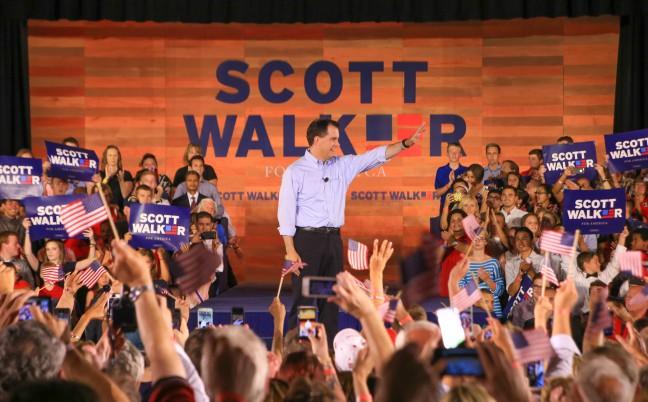After Gov. Tony Evers defeated former incumbent Gov. Scott Walker in a neck-and-neck race, questions of what would be made of Walker’s future lingered.
Walker told his supporters in an email sent on Jan. 1 that he plans to continue living in Wisconsin, but will travel around the country working for a speakers’ bureau and a number of unnamed companies, and assist President Donald Trump and Vice President Mike Pence in their 2020 reelection campaign, according to the Milwaukee Journal Sentinel.
Before this email was sent, Walker told reporters that he had no plans to accept a position in the Trump administration, according to CBS58. University of Wisconsin political science professor John Witte said if Walker did take a position in Washington, there would be nothing odd about it, though Witte was unsure if Walker would.
“Does he want to go to Washington, does his family want to go to Washington?” Witte said. “I think he’s really devoted to his family, and his kids are in college now, and his wife is here and I don’t think she’s given any indication that she wants to move to Washington.”
Walker told supporters he and his wife would help Trump and Pence in their bid for reelection in 2020, according to the Milwaukee Journal Sentinel, despite some tension between Trump and Walker during the 2016 presidential race.
When Walker dropped out of the race, he urged fellow Republicans to do the same “so that the voters can focus on a limited number of candidates who can offer a positive conservative alternative to the current front-runner,” Walker said in his withdrawal speech, according to the Journal Sentinel.
Just two months before Walker dropped out of the presidential race, Trump attacked Walker on Twitter.
“When people find out how bad a job Scott Walker has done in WI, they won’t be voting for him. Massive deficit, bad jobs forecast, a mess,” Trump tweeted.
According to Business Insider, Trump told his supporters the feud started after one of Walker’s fundraiser’s called Trump “dumb-dumb.” Trump also told attendees that he and Walker had left each other alone for a while, but now that someone on Walker’s side had started it, he could insult Walker.
But three years later, Trump tweeted his endorsement of Walker in the 2018 gubernatorial Republican primary, calling him a “tremendous” governor, and applauding the number of jobs bringing Foxconn to the area created.
Walker does not plan to run in the 2024 election according to the Milwaukee Journal Sentinel. UW College Republicans’ spokesperson Alec Bukowiec said Walker wants to continue to work towards his goals for Wisconsin.
“He’s looking to continue his work to move Wisconsin forward,” Bukowiec said. “[Walker plans on] continuing to do what he has for the last eight years and doing the best for Wisconsin.”
But some constituents are unsure if some of Walker’s political moves were in the interest of all Wisconsinites, such as UW College Democrats’ spokesperson Cecilia McDermott.
For McDermott, one thing that solidified this was Walker signing three bills into law during the time between Evers’ election and inauguration, commonly known as the “lame-duck period.”
The controversial pieces of legislation, which weaken the incoming governor and attorney general and restrict early voting periods, were called a partisan power grab which Walker enabled, according to Politico.
Witte said even if the legislation weakens the attorney general and governor, Wisconsin’s governor still holds an enormous amount of power, having the ability to veto line items in the budget. McDermott, however, sees a more negative side of the legislation.
“It was more about remaining in control even though the people of Wisconsin voted for a different party,” McDermott said. “It feels like they’re kind of undermining our democracy.”
Whether or not the legislation had the aim of empowering Republicans, McDermott said the people of Wisconsin will remember not only the lame-duck legislation, but that Walker was voted out of office should he decide to run for another public office, which Walker is considering doing in four years, according to the Associated Press.
Witte, however, said he didn’t think the lame-duck legislation Walker signed would severely impact him in any future endeavors, saying the legislation was “complicated” and people will forget in a few years.
Bukowiec said Walker would be remembered more for everything else he did in office, regardless of the possible public perception of the lame-duck legislation.
“The constituents of Wisconsin will remember Scott Walker for his legacy, for his eight years of success as governor,” Bukowiec said.


